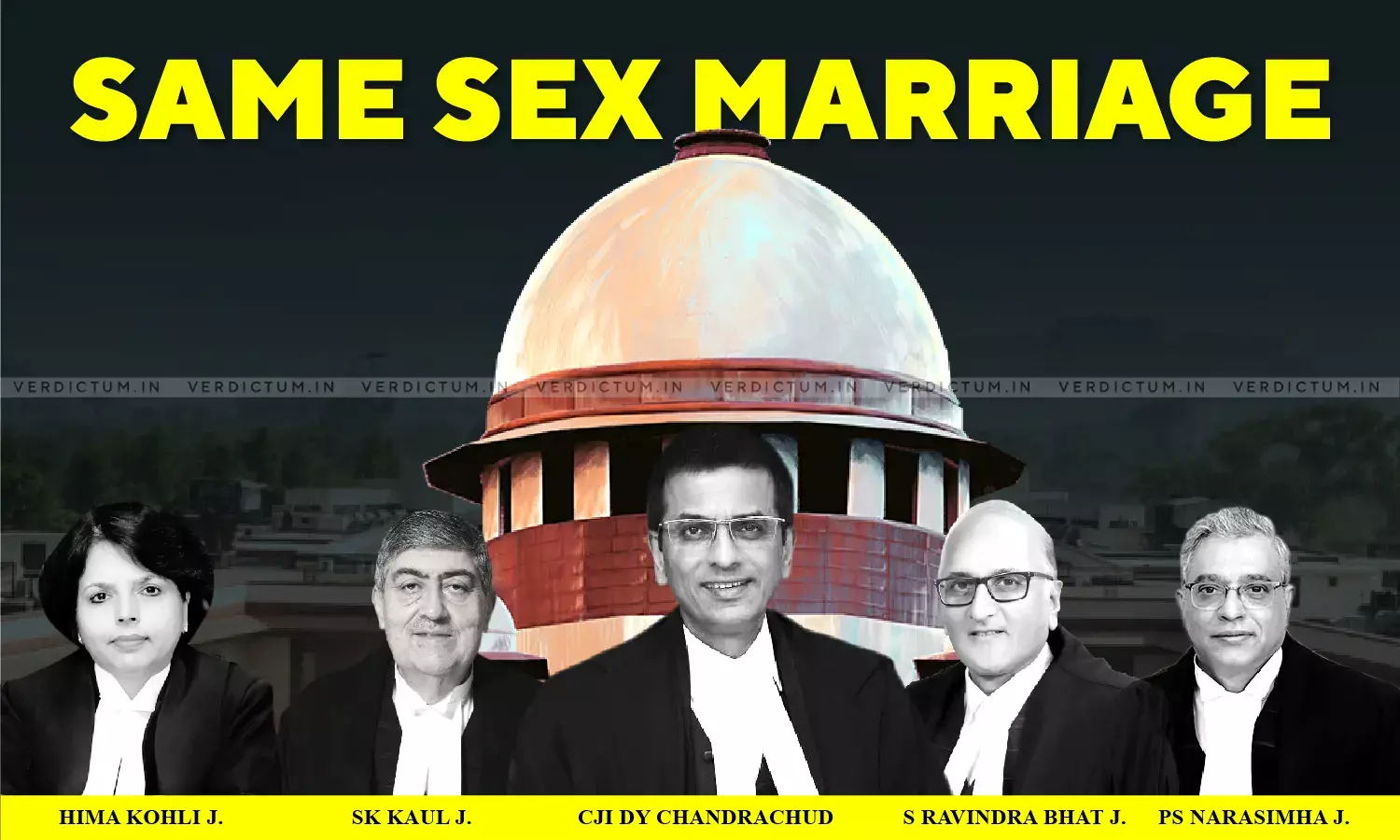Challenge To Special Marriage Act Provision Requiring Notice To Be Assigned To Two Judge Bench In Cases With Standalone Prayer: CJI
In the sixth day of the Supreme Court Constitution Bench hearing matters seeking the legalization of same-sex marriages, the Court said that the challenge to notice provision in the Special Marriage Act, 1954 if is a standalone prayer then the matter can go to a 2-judge Bench separately.
While the Court discussed the proceedings ahead, the bench suggested that the point on ‘legislative exercise’ need not be raised again by the subsequent counsels to avoid repetition.
A Constitution Bench with Chief Justice DY Chandrachud, Justice Hima Kohli and Justice P.S. Narasimha, and Justice S Ravindra Bhat sitting in Court and Justice SK Kaul participating virtually is hearing the matter. Solicitor General Tushar Mehta continues to argue today while the petitioners have already concluded their arguments.
"The challenge to the notice provisions in SMA, if that challenge is a standalone prayer, we can assign it to a constitution of a two-judge bench separately. A junior could check if it is a standalone prayer. It applies to heterosexuals and others also", CJI opined.
"I would like to show that it perhaps may be an option to not go into personal laws while dealing with the SMA", SG then submitted.
"Yes, that you can show, but don't argue on merits. Because even the other side was not heard on it", added CJI.
Section 4 and 5 of the Act provides for certain requirements that need to be fulfilled and a notice as a prerequisite for the intended marriage, pursuant to which the marriage between any two persons may be solemnized under the Act. It states:-
4. Conditions relating to solemnization of special marriages.—Notwithstanding anything contained in any other law for the time being in force relating to the solemnization of marriages, a marriage between any two persons may be solemnized under this Act, if at the time of the marriage the following conditions are fulfilled, namely:—
(a) neither party has a spouse living; 1[(b) neither party—
(i) is incapable of giving a valid consent to it in consequence of unsoundness of mind; or
(ii) though capable of giving a valid consent, has been suffering from mental disorder of such a kind or to such an extent as to be unfit for marriage and the procreation of children; or
(iii) has been subject to recurrent attacks of insanity
(c) the male has completed the age of twenty-one years and the female the age of eighteen years; 3[(d) the parties are not within the degrees of prohibited relationship: Provided that where a custom governing at least one of the parties permits of a marriage between them, such marriage may be solemnized, notwithstanding that they are within the degrees of prohibited relationship; and] 4(e) where the marriage is solemnized in the State of Jammu and Kashmir, both parties are citizens of India domiciled in the territories to which this Act extends]. 5[Explanation.—In this section, “custom”, in relation to a person belonging to any tribe, community, group or family, means any rule which the State Government may, by notification in the Official Gazette, specify in this behalf as applicable to members of that tribe, community, group or family: Provided that no such notification shall be issued in in relation to the members of any tribe, community, group or family, unless the State Government is satisfied—
(i) that such rule has been continuously and uniformly observed for a long time among those members;
(ii) that such rule is certain and not unreasonable or opposed to public policy; and
(iii) that such rule, if applicable only to a family, has not been discontinued by the family.
5. Notice of intended marriage.—When a marriage is intended to be solemnized under this Act, the parties to the marriage shall give notice thereof in writing in the form specified in the Second Schedule to the Marriage Officer of the district in which at least one of the parties to the marriage has resided for a period of not less than thirty days immediately preceding the date on which such notice is given.
During the course of his arguments today, the Solicitor General submitted that the arguments made by the petitioners against restriction on same-sex marriage in the Special Marriage Act can possibly be used in future to challenge the restriction on incestuous marriages in the same statute.












